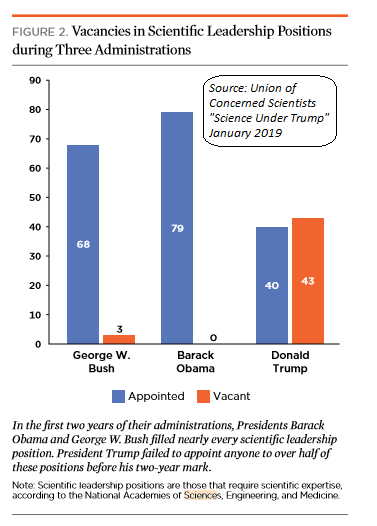Tech's Immigration Double-Bind in 2019
Tech workers laid off and replaced by lower-paid H1B workers may be less loyal and dedicated to their next employer, if the anecdote at the bottom of this blog post is of a pattern. And foreign workers have fewer workers' rights than native workers. Together, these facts could trap America's technology sector in a Trump double-bind.
Why? Because President Trump teased native tech workers with talk he planned to scale back H4 work visas and H1B visas granted to non-citizen workers. (President Obama's administration both increased the number of H1B visas and added work permissions to H4 resident visas.)
If this were more than a blog post, the reporter of this story would track down whether President Trump walked his talk on scaling back foreign worker visas. If President Trump did as he said -- or merely refrains from announcing he didn't -- he'll earn under-the-radar appreciation from "native" techies (a group that includes Indian-American workers who've gained citizenship.) On first blush within this context, cutting the number of work visas begets a technology rank-and-file more dedicated to their jobs. (More on that below.)
But not all is well for science and technology under this president. The Union of Concerned Scientists in January published an alarming infographic in their 2019 "Science Under Trump" report. The chart shows the unfilled government science leadership jobs in this administration compared to both Obama's and Bush's administrations.
This week, another reminder of technology's "Trump immigration crackdown double-bind" surfaced.
At the information security conference known as RSA in San Francisco today, a session on cryptography featured a video link to one of the panelists. He couldn't get a travel visa. RSA stands for the three founders of the conference, and the remote panelist was Adi Shamir (the 'S'):
From the Humans of New York series, readers can learn from one person less dedicated to his next employer after being laid off:
---------------------------
Further Reading:
"Bounced back tonight at #SXSW. It's crazy how much of the value that's delivered at this conference is before and after the sessions." twitter.com

This work by AJ Fish is licensed under a Creative Commons Attribution-NonCommercial 4.0 International License.
Why? Because President Trump teased native tech workers with talk he planned to scale back H4 work visas and H1B visas granted to non-citizen workers. (President Obama's administration both increased the number of H1B visas and added work permissions to H4 resident visas.)
If this were more than a blog post, the reporter of this story would track down whether President Trump walked his talk on scaling back foreign worker visas. If President Trump did as he said -- or merely refrains from announcing he didn't -- he'll earn under-the-radar appreciation from "native" techies (a group that includes Indian-American workers who've gained citizenship.) On first blush within this context, cutting the number of work visas begets a technology rank-and-file more dedicated to their jobs. (More on that below.)
But not all is well for science and technology under this president. The Union of Concerned Scientists in January published an alarming infographic in their 2019 "Science Under Trump" report. The chart shows the unfilled government science leadership jobs in this administration compared to both Obama's and Bush's administrations.
This week, another reminder of technology's "Trump immigration crackdown double-bind" surfaced.
At the information security conference known as RSA in San Francisco today, a session on cryptography featured a video link to one of the panelists. He couldn't get a travel visa. RSA stands for the three founders of the conference, and the remote panelist was Adi Shamir (the 'S'):
Fewer travel visas could hurt America's tech sector if people like Adi Shamir can't engage in private as well as public confabs on the premises. In this case, stricter immigration policies hurt the country's technology sector. So why is the immigration crackdown a technology sector "double-bind" as the blog post title says?Unbelievable. The Cryptographer’s Panel at @RSAConference 2019 is missing Adi Shamir (the “S” in RSA), who was unable to secure a US visa.
— Mathew J Schwartz (@euroinfosec) March 5, 2019
Adi in a video to #RSAC: “Perhaps it's time we rethink the question of how and where we organize our major scientific conference." pic.twitter.com/xBnKzEEFtG
From the Humans of New York series, readers can learn from one person less dedicated to his next employer after being laid off:
“I’m on my fifth job in eleven years. It’s not that I don’t do good work. The layoffs have always been tied to company performance, or just being in the wrong position at the time. But the instability has caused me to rethink my relationship to work. My first job out of college, I lived and breathed work. I managed a team. I was always available. I’d answer emails at midnight. I took work calls on my wedding day. And I never minded. I felt like the magical cog that kept everything going, and that indispensability was a big part of my confidence. So I took it pretty personally when I got laid off. Dozens of people lost their job that day, but I still saw it as a personal failure. After that I was forced to separate my identity from work. I’m trying to measure myself on how I interact with friends and family...It's unlikely the above New York Human confessed to his employer he began his tenure less dedicated than he was to his first job. And his former work habits sound excessively dedicated to the point of being unhealthy. But he's illustrative of the state our working people live in when foreign tech workers with fewer workers' rights fill coveted science and technology jobs.
---------------------------
Further Reading:
"Bounced back tonight at #SXSW. It's crazy how much of the value that's delivered at this conference is before and after the sessions." twitter.com

This work by AJ Fish is licensed under a Creative Commons Attribution-NonCommercial 4.0 International License.



